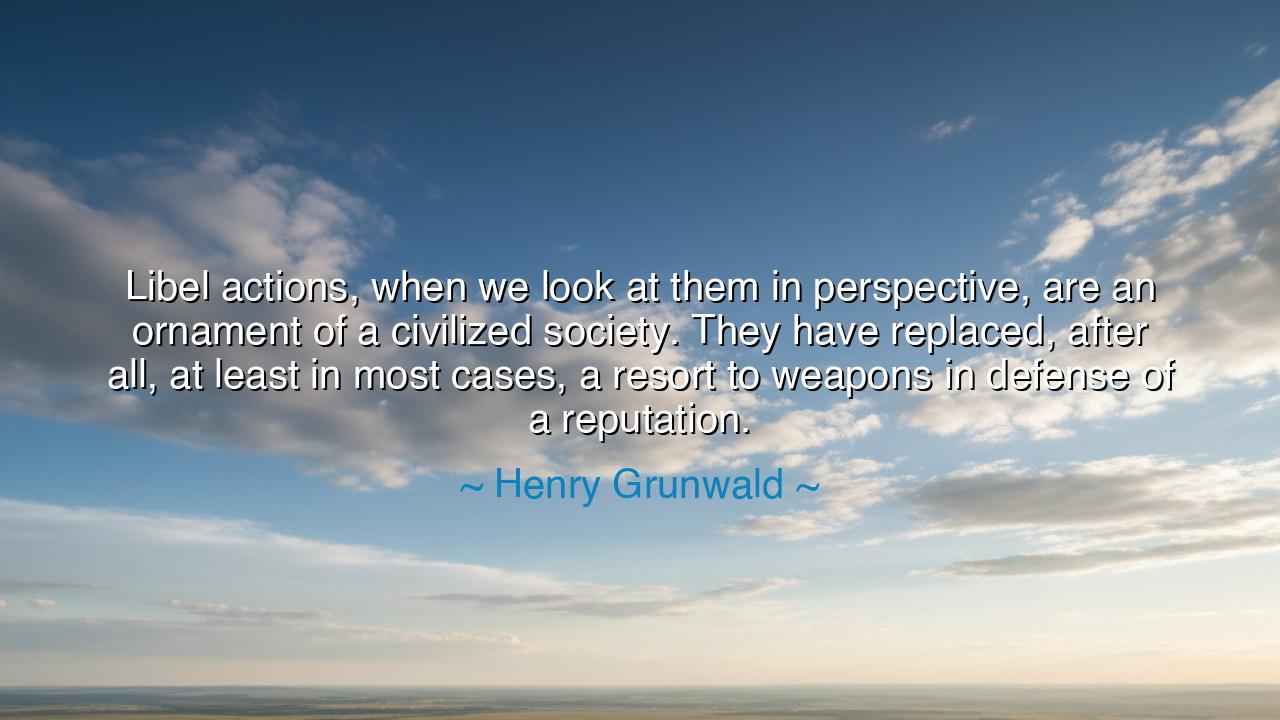
Libel actions, when we look at them in perspective, are an
Libel actions, when we look at them in perspective, are an ornament of a civilized society. They have replaced, after all, at least in most cases, a resort to weapons in defense of a reputation.






Henry Grunwald, with a voice both sharp and wise, declared: “Libel actions, when we look at them in perspective, are an ornament of a civilized society. They have replaced, after all, at least in most cases, a resort to weapons in defense of a reputation.” These words ring like the toll of a great bell, reminding us that the true mark of civilization is not the absence of conflict, but the refinement of how conflict is resolved. Where once men drew steel at the whisper of an insult, now they turn to the courts, to reason, and to law. What was once defended with blood is now defended with words. And in this transformation lies the fragile beauty of order over chaos, discourse over violence.
In the days of the ancients, an insult to one’s name was a mortal wound. A man dishonored might call for a duel; blood would stain the earth to wash away words. In many lands, from the fields of France to the plains of America, honor was measured not in truth but in the willingness to die for it. How many lives were ended, not because of great wars or noble causes, but because of a careless tongue? Grunwald’s observation reveals the triumph of a higher age, in which society itself provides a shield against calumny, sparing its people the endless cycle of vengeance.
Consider the tale of Alexander Hamilton and Aaron Burr. Two men of towering ambition, once allies, torn apart by slander and rivalry. In 1804, their dispute led to the infamous duel at Weehawken. Hamilton fell, struck down not by the verdict of a judge, but by the bullet of a pistol. His death was not the victory of justice, but the tragedy of pride untempered by law. Had their society possessed the reverence for libel actions that Grunwald speaks of, the matter might have been weighed in the balance of reason, not resolved in the smoke of gunpowder. Thus, the law, however imperfect, preserves not only life but the dignity of a nation.
Grunwald calls libel actions an ornament, and rightly so. An ornament is not mere utility, but a sign of refinement, of beauty added to strength. The existence of such legal remedies signifies that society has chosen a higher path, where reputation is valued but life is sacred. It means that men and women no longer need to sharpen swords to defend their names; instead, they can appeal to a shared sense of justice. This is the hallmark of civilization: the replacement of vengeance with order, of private fury with public judgment.
Yet, the lesson is not without its shadows. For even in the courts, truth must reign. A libel action is noble only when it seeks to uphold honesty and protect the innocent. When twisted into a weapon of silence, it becomes a new form of oppression, a shield not of honor but of tyranny. The ancients knew that every great invention, every noble law, could be corrupted if wielded by unjust hands. Thus, we must remain vigilant, guarding the balance between free speech and falsehood, between the right to speak and the right to be protected from lies.
What, then, should the listener take from these words? First, cherish the fact that you live in a society where disputes of reputation need not be bathed in blood. Recognize this as a triumph of human progress, hard-won through centuries of violence. Second, uphold honesty in your own words, so that you never strike another’s name unjustly. And third, should your own honor be assailed, seek resolution not through rage or vengeance, but through the channels of law and reason. In doing so, you both preserve your dignity and strengthen the civilization that sustains you.
Let Grunwald’s wisdom endure as a guide: “They have replaced, after all, a resort to weapons in defense of a reputation.” This is no small victory, but the sign of a society that has chosen wisdom over pride, restraint over destruction. Let us not return to the fields of duels and vendettas, but instead walk the path of law, where truth may be sought without bloodshed. In this way, we honor both the lives of men and the power of words, and we carry forward the fragile ornament of civilization into the future.






AAdministratorAdministrator
Welcome, honored guests. Please leave a comment, we will respond soon